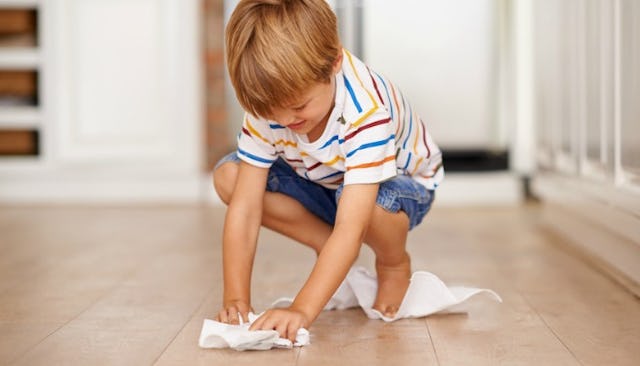Kids Can Do Sh*t By Themselves

I wouldn’t call myself a helicopter parent. I never set out to intentionally hover over my children and come running at the first sound of a stumble or scream. When you have two kids in less than a year, though, the mom Spidey sense is on high alert all the time, and so it just kind of happened that I became a mom who stopped and sprinted and monitored all the things.
Until a couple of weeks ago.
My babies are no longer babies. They are 3 and 4 and, as I’ve recently learned, can actually do shit by and for themselves. You may have already experienced this and are thinking, well, DUH, lady, but it wasn’t until I’d had enough that I learned what they were capable of.
Being an introvert and a SAHM isn’t easy to balance, and I try really hard, but there are days when I want to run away screaming from my home, stripping off my clothes, pulling my hair out, and heading for the hills. The constant touching, little hands pulling and poking and rubbing. The incessant talking all the time, about nothing. The “needing” me to do everything for them at their whim. And then there’s the whining and so much screaming. They want me to play with them, or their brother isn’t playing right, or their sister picked a show to watch that he doesn’t want to watch. It goes on, and on, and on, and on.
I reached a point where I was tired of being the referee. I was tired of being the eternal playmate. I was tired of being unable to get my own shit done because I (thought I) had to watch their every move. One morning when I was in the midst of folding laundry and my son asked for a string cheese snack, I squared my shoulders, took a deep breath, and said, “Okay. You can get it yourself.”
He looked at first surprised, then overjoyed with excitement. He ran to the fridge, and I told him where his snack could be found. And that one little moment of independence led to so many more.
I started allowing my kids to do more things on their own. I gave my daughter the tools and “ingredients” to make her own peanut butter sandwich and nothing tragic happened. She was thrilled with the new responsibility — she even put the dirty plastic knife in the trash — and I was thankful for the chance to walk away for a few minutes.
If I’m very specific about the color and type of clothing, my son can get dressed all by himself. I don’t even care if his shirt is on backward because it was a moment in my day where I was able to continue doing what I needed to do sans interruptions.
It turns out kids can entertain themselves if you ignore them long enough. Not in an abandonment way, but in a “I’ve got stuff to do; you’re on your own” way. I’m teaching them to be independent and to work with one another. No longer am I the only person capable of finding lost toys or getting snacks. They are old enough to do these things on their own.
No longer am I the constant referee for their arguments. I listen and make sure no blood is being shed and act as a mediator if things are escalating, but I no longer intervene every time someone raises their voice or gets in a tug-of-war over a stuffed animal.
No longer am I the constant attention-giver. It’s important they know that while they make my world go ’round, they can’t be the center of my universe every minute of every day. They have to learn to find their own entertainment.
I originally took this path out of self-preservation. I needed time to take care of me, my work, and my house. I needed time to breathe, to sit down for a few minutes. While it started off as being a sanity-saver for me, it turned into something greater.
Instead of being the cruise director of fun for my kids, I’m now their mom — the person charged with raising strong and capable individuals who don’t play the victim. It wasn’t easy, and we’ve had some challenges, but because I stepped back, it allowed them to step up. I gifted them with responsibilities and independence, and they in turn gifted me with a much more harmonious household.
This article was originally published on